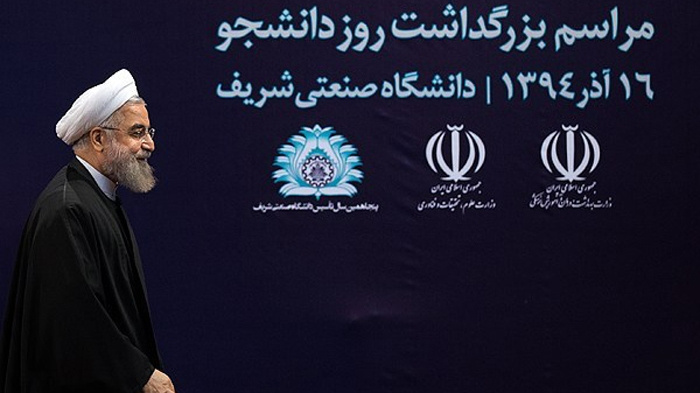Rouhani Relies on University

By: Arezou Gholami
With its multifaceted nature, December 7th, Student’s Day, is different from other recognized state-sponsored anniversaries of the Islamic Republic. Unlike other anniversaries, it is neither organized by the Coordination Council of the Islamic Development Organization, nor marked by unapproved, ‘illegal’ gatherings.
For the Principlist camp of the establishment, December 7 is commemorated as a constituent of the Islamic Revolution’s identity since it allegedly marks the invention of the Death to USA slogan in 1953 (correction: the Death to USA chants emerged in 1979 and after seizure of the US Embassy in Tehran. In 1953, students’ protests in Tehran University were against restoration of ties with Britain, although they took place a few days before then US Vice President Richard Nixon’s visit to Iran). The occasion also bears significance for the Reformists, not because of its historical anti-American roots, but for the strong tie between the university, which they regard as their arm, and the Reform movement.
But December 7th has also functioned as a seismograph of Iran’s political atmosphere; held in a vibrant mood whenever a dynamic political mood has prevailed. The tradition of the president making a speech in a university [in Tehran] and the Q&A session with students that follows virtually came to a halt during the 8-year presidency of Mahmoud Ahmadinejad. Ahmadinejad’s first December 7 visit was to Amir Kabir University during the second year of his presidency, where he faced fierce protests from the students. Thus he preferred to spend the following anniversaries in venues such as Imam Sadegh University among handpicked students.
Against this pattern, Rouhani’s visit to Shahid Beheshti University on the anniversary of December 7th in his first year of presidency signaled a shift in Iran’s political atmosphere. “University is not a political club for parties,” he said. “It is a workshop in politics however.” Rouhani’s speech during his first visit bore traces of Reformist discourse, far from the expected anti-American rhetoric. He presented a report of the first 100 days of his administration, and reminded his audience of the government’s limitations.
In 2013, the first year of Rouhani’s presidency, other political figures also found a chance to make speeches in universities. Though he found no chance to visit a university, Mohammad Khatami, head of the Reform Government, had his video message broadcast for students. Reformist politicians such as his brother, Mohammad-Reza Khatami, attended universities, delivering speeches which mainly betrayed a conciliatory tone that aimed to relieve pressure from universities after eight tough years. In Sharif University, Hossein Shariatmadari, the [hardliner] editor-in-chief of Kayhan Daily was the keynote speaker. Other Principlist figures including Mohammad-Bagher Ghalibaf, Hassan Saffar Harandi, and Saeed Jalili attended a university, using the same rhetoric they had employed in the preceding six years and which was rejected by Iranian citizens in the 2013 presidential elections.
Rouhani gave his second December 7 speech while change in economy and foreign policy was yet to be sensed by Iranians and pressures on the government were at their highest point. His tone was sarcastic, slamming political “upstarts” and reminding the audience how his ministers were either disqualified or impeached by the parliament. He claimed that opponents “do not allow” his administration to proceed with its plans.
Rouhani delivered his third Student’s Day speech in Sharif University in Tehran on Monday. Hopes are higher now with the nuclear deal having weathered the toughest stage. Although not in its ideal state, the economy is experiencing stability and there are no price hikes. Rouhani knows well that the ‘Moderation Government’ needs supporters that do not evaluate his conduct based on bread or gasoline prices. That is why he missed no opportunity and welcomed the challenging Q&A sessions of December 7th.
The nuclear crisis has come to an end, Iran is following a new foreign policy in relations with regional neighbors and Western powers, and the healthcare system is functioning efficiently. A few months before the parliamentary election, the public opinion is now concerned about two basic issues: disqualification of potential candidates, and the alarming state of corruption that is a natural product of the current economic structure. Abolition of corruption, nonetheless, needs a determination to fight against rogue elements. That is why Rouhani pronounces that “no authority may be spared from questioning”, and in words reminiscent of his electoral campaign, speaks of an atmosphere that exudes “safety, not security”. Reactions to Rouhani’s remarks are on the way.
* This post was originally published by Vaghaye Ettefaghieh, a newly-publishing Reformist daily owned by Sadegh Kharrazi, Iran's former ambassador to the UN and France.

